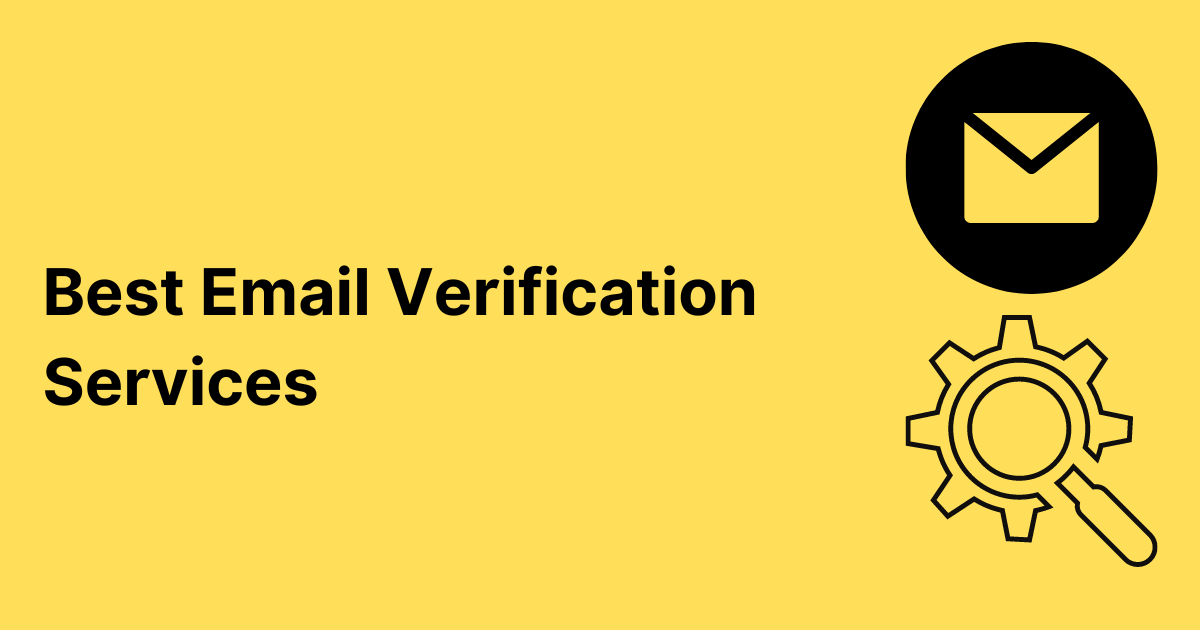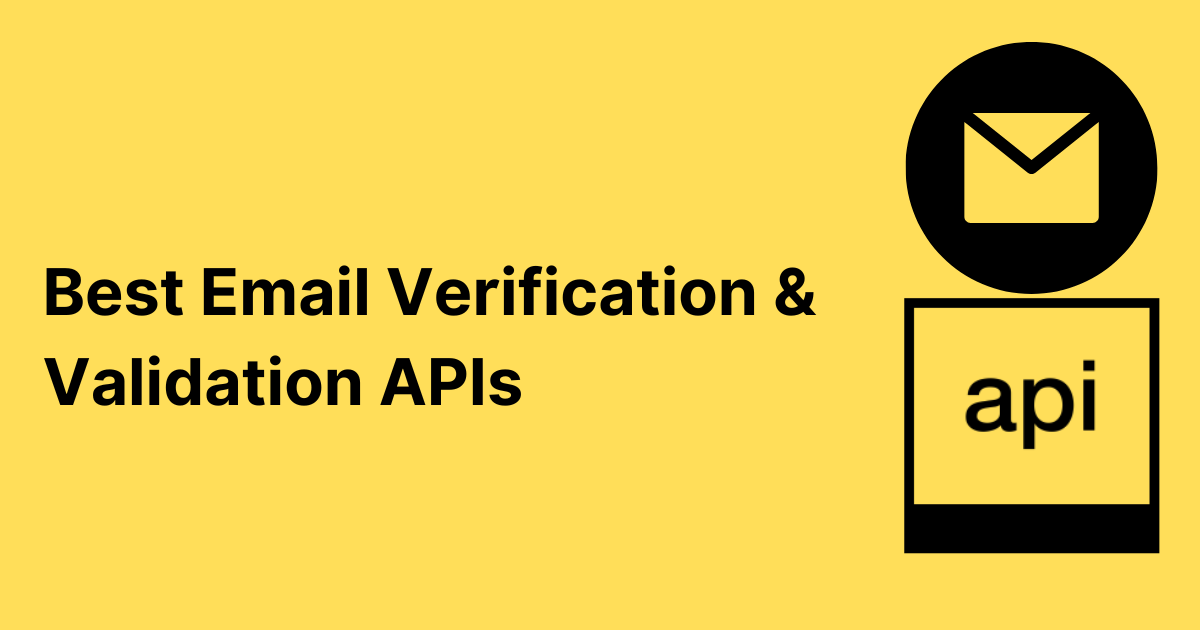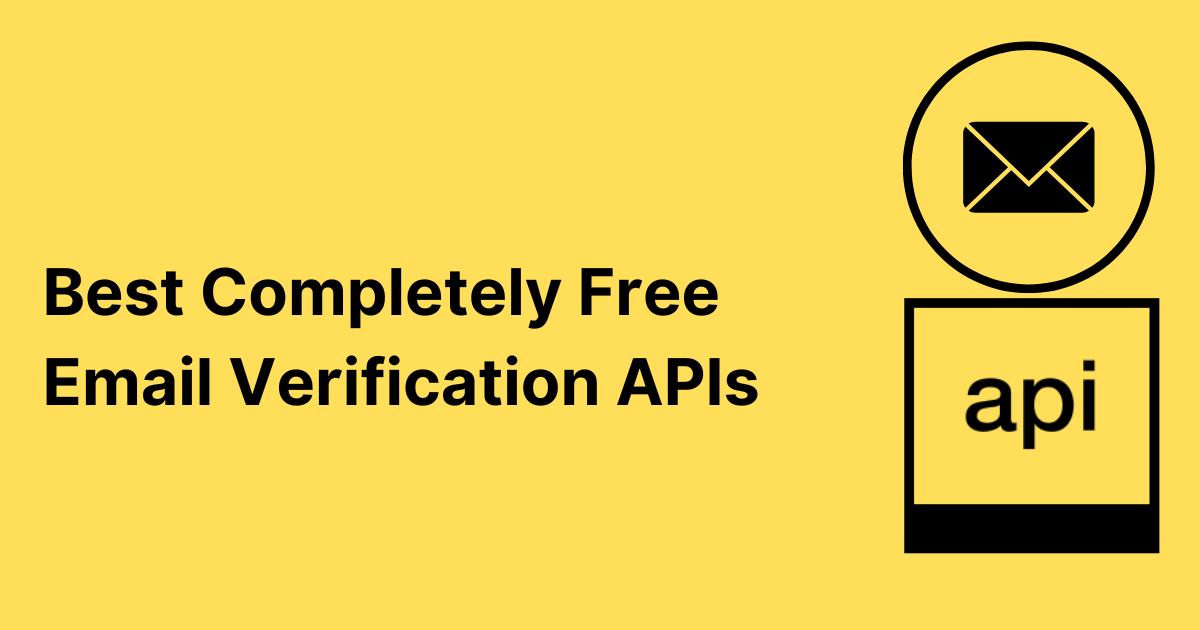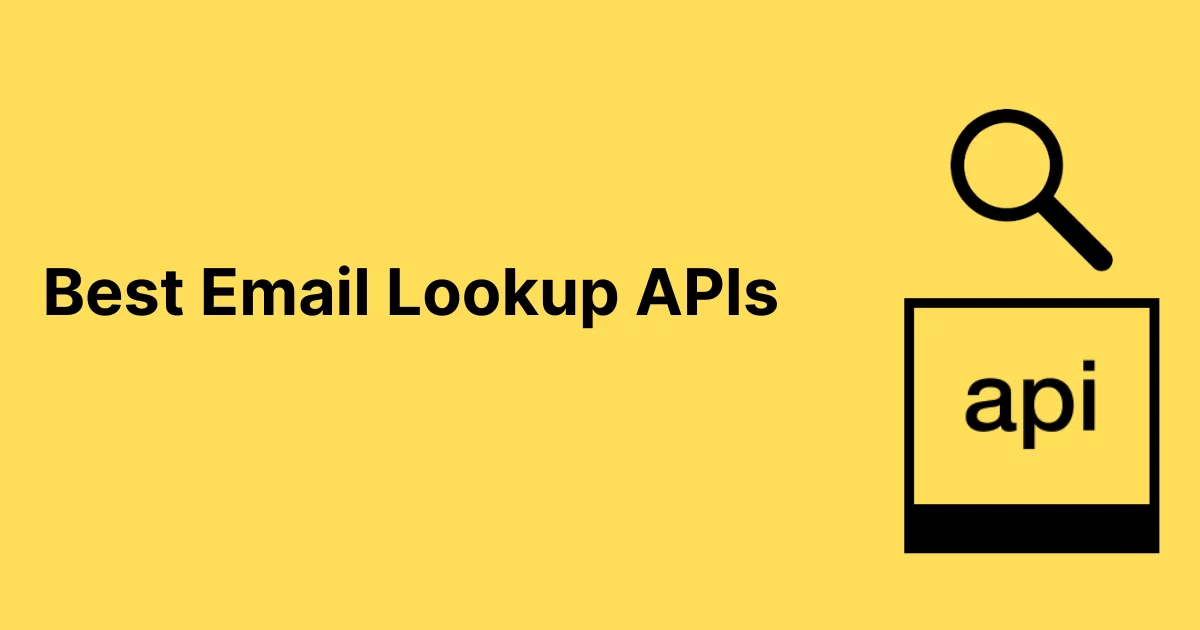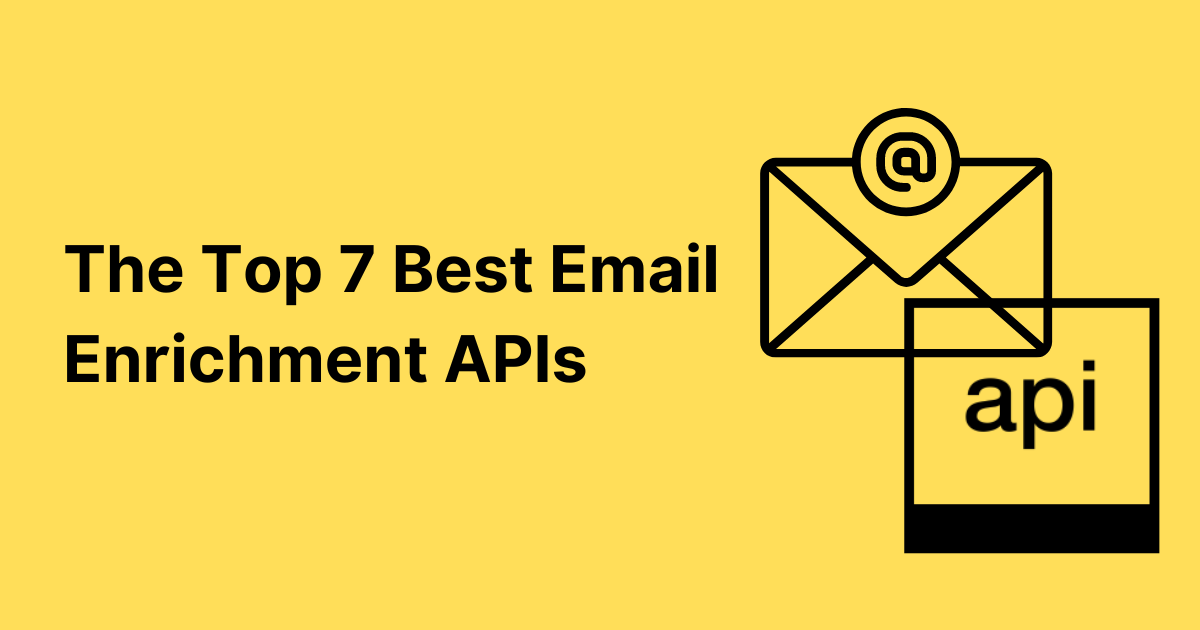If you’re looking for the best email verification service, good! You must know how important it is to keep your email list verified, validated, and clean. In fact, your prospecting and marketing efforts depend on it.
Without vetting your prospect list, you risk tanking your sender reputation with high bounce rates by sending to invalid email addresses, spam traps, and disposable emails – or simply wasting time and marketing dollars sending email campaigns to the wrong people.
In this article, we’ll dive into the best email verification tools, what they do well, what they don’t, and everything in between.
What is an Email Verification Service?
An email verification or lookup service helps identify and eliminate invalid, inactive, or risky email addresses that can hamper the effectiveness of your email marketing campaigns. By using advanced algorithms and real-time API checks, as well as syntax and format validations, these services make sure you’re getting the highest possible deliverability rates from your email marketing efforts.
Why is it Important to Verify Emails?
The most important thing you can do as a marketer is to verify email deliverability. Here are some reasons you should be utilizing an email verification tool.
- Enhanced Deliverability: An email verification service lets you maintain a clean email list by removing undeliverable addresses, improving your sender reputation, and getting your emails to where they need to be.
- Cost Optimization: Sending emails to invalid or non-existent addresses is a waste of time and money. By eliminating fake or invalid emails from your email database, you can significantly reduce bounce rates, increase the effectiveness of your outreach efforts, and lower email marketing costs.
- Protecting Sender Reputation: ISPs and email service providers closely monitor sender reputation to determine email placement. An email verification service helps you maintain a positive sender reputation by reducing hard bounces, spam complaints, and potential blacklisting.
- Minimizing Spam Complaints: If you consistently email invalid or unwanted addresses, you can increase the chances of recipients marking your messages as spam. You may also be inadvertently sending spam traps and role-based emails. An email verification service helps minimize spam complaints.
- Data Quality: Inaccurate email data can negatively impact your customer insights and analysis. By verifying email addresses, you can obtain accurate and reliable data, enabling better segmentation, personalization, and targeting in your email marketing campaigns. Some tools even leverage email enrichment APIs and duplicate email checks.
How do Email Verification Tools Work?
How do email verification tools actually work? What is the magic that goes on behind the scenes?
These tools usually combine verification, validation, and enrichment to improve deliverability and help your sender reputation.
Here are some examples of what the email verification API might do behind the scenes.
- Perform a syntax check of the email address to validate for syntax errors and make sure it follows the correct format. This step verifies if the address has a valid structure, like having an “@” symbol and a domain name.
- Verifies the domain of the email addresses. It checks if the domain exists and has a valid DNS record, which provides a way to map a domain name to a valid and legit IP address.
- Simple Mail Transfer Protocol (SMTP) check initiates a conversation to validate the existence of the email address by sending a “ping” to the server to check the response code. If the response indicates that the email address exists, it passes this step.
- The service attempts to validate the existence of the mailbox associated with the email address. It sends a test email to the address and monitors the response from the recipient’s mail server. The service analyzes the response to determine if the email was successfully delivered, bounced, or if any other error occurred.
- Some email verification services check if the email address is from a temporary or disposable email provider and leverage spam trap detection. These providers offer temporary email addresses that are used for spamming or fraudulent activities. This helps prevent the use of bad emails.
- Identify role-based email addresses, such as [email protected] or [email protected]. These addresses are not associated with specific individuals and are commonly used for organizational purposes.
- After completing the verification process, the service provides a report or a status code indicating the validity and deliverability of the email address. The report may include details like the domain status, mailbox status, and any additional information obtained during the verification process.
Top 7 Email Verification Services: Compared Side-by-side
| Email Verification Service | Pay as You Go? | Subscription? | Free Version |
|---|---|---|---|
| Clearout | Yes | Yes | 100 Free Credits |
| Pabbly | No | Yes | No |
| Xverify | Yes | No | Only a few free verifications |
| AbstractAPI | No | Yes | 100 Requests |
| Verifalia | Yes | No | 25 daily credits |
| Hunter | No | Yes | 25 searches and 50 verifications per month |
Best Email Verification Services
1. Clearout

- AI-powered deliverability insights
- Easy-to-use
- Well-documented API
Clearout offers tools to help prospect, validate, and vet emails. Its email verification service is easy to use and offers bulk and real-time email verification. Like an Email Lookup API, it can also locate emails for you.
Things it Does Well
- Prospecting. Clearout leverages AI to take prospecting to another level. Its Chrome extension captures lead information directly from LinkedIn and other websites. Using a series of web scraping techniques, it enriches and verifies their contact information automatically. Then, you can add it to Clearout’s lead database where you can track and segment all of your prospects in one place.
- The email finder is a definite value-add. You’re able to search individually by name and company or use the bulk finder, which lets you upload a CSV of prospect names and companies and Clearout will return their email addresses. Each email comes with a confidence score – a value that assesses the likelihood of a valid email.
- Leverage email verification in your custom applications. The Clearout email verification API is well-documented and provides tons of flexibility.
Best suited for
Businesses of all sizes prioritize email list hygiene and want to improve deliverability rates.
Top use case
Cleaning and verifying email lists, reducing bounce rates, and enhancing lead quality.
Limitations
Reviewers of Clearout would like to see more direct integration capabilities and complain of periods of lag.
Pricing
Clearout offers a flexible pay-as-you-go model or monthly subscription. With pay-as-you-go, you can purchase a bucket of credits, receiving a volume discount based on the amount.
The monthly subscription offers a set amount of credits that renew after each month. For example, the lowest subscription starts at $31.50 a month for 5,000 credits and goes all the way to $4,050 a month for 5,000,000 credits.
2. Pabbly
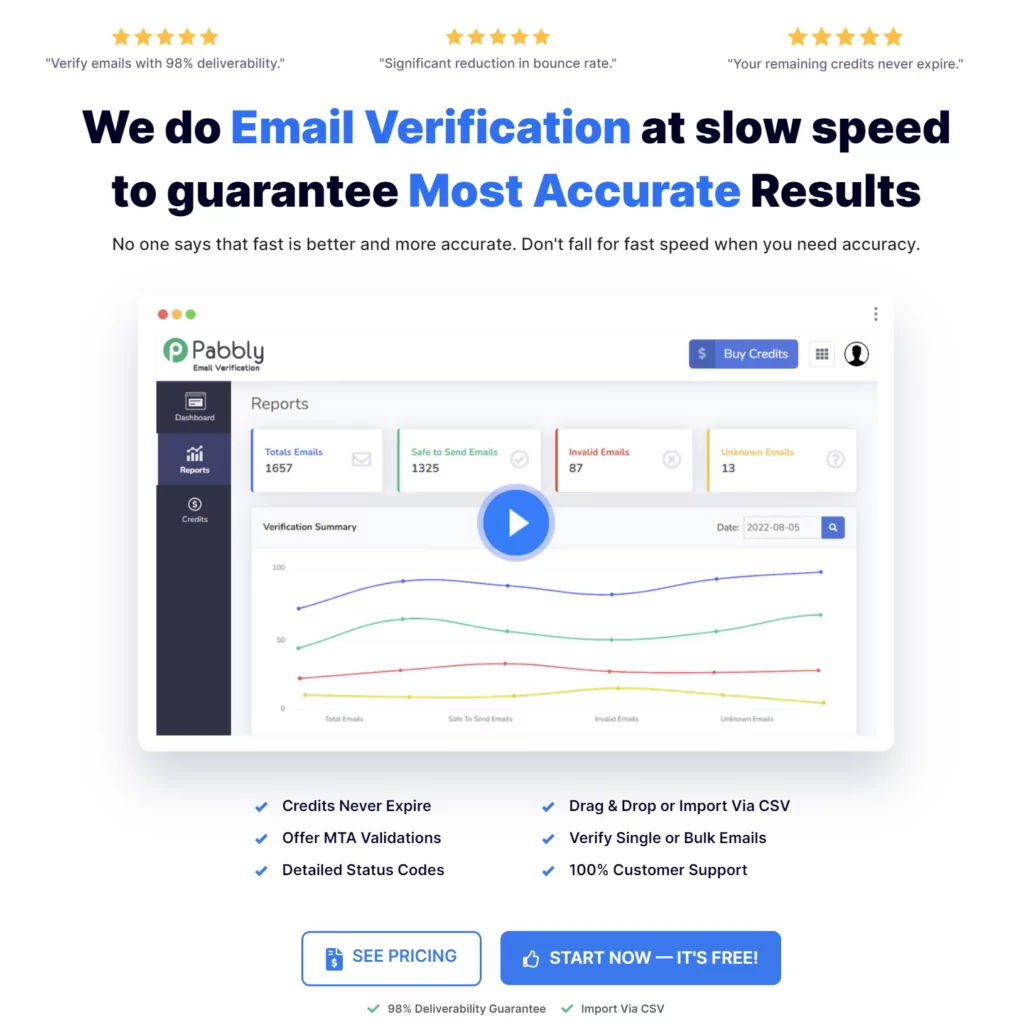
- Comprehensive form builder
- Native Integrations
- Highly accurate
Pabbly does more than meets the eye. Beyond an email verification service, Pabbly offers workflow automation, data integration, and robust email marketing capabilities.
Things it Does Well
- Form Builder. Pabbly offers comprehensive online form-building software to collect payments, lead submissions, and whatever workflow you need. These beautiful and responsive forms are mobile-friendly and easy to customize. Integrate with several services, add conditional logic, and accept payments – all with a drag-and-drop editor.
- Pabbly Connect. Pabbly Connect is a competitor to Zapier – it allows you to connect applications together and streamline your processes. For example, when a lead is generated on Facebook, add them as a subscriber to your marketing list, and send them a message.
- Accurate email verification. Pabbly claims to be the most accurate email verification service in the market with fewer false positives, fewer catch-alls, and fewer unknown addresses.
Best suited for
Small businesses and startups that require robust lead capture and email verification capabilities in one platform.
Top use case
Capturing leads and managing the end-to-end nurturing of the sale process.
Limitations
Reviewers often complain about the difficult setup and learning curve. It can also be difficult to debug issues.
Pricing
Pabbly offers four tiers of monthly subscriptions. Each tier includes a number of emails that can be verified and validated, detailed reports, and full customer support.
- Basic– $5/mo gets 1,000 emails validated
- Standard – $15/mo gets 5,000 emails validated
- Pro – $25/mo gets 10,000 emails validated
- Ultimate – $37/mo gets 15,000 emails validated, although you can increase this by up to 10,000,000 for an additional cost.
3. Xverify

- Great at managing sender reputation
- Flexible API implementations
- Fraud protection
Xverify is a powerful verification tool perfect for teams dealing with a large volume of inbound leads. With a flexible API, you can integrate email validation anywhere!
Things it Does Well
- Flexible implementation. Whether you need a bulk email verifier or want to build your own application using their API, you can choose how you want to verify your emails. You can also use JavaScript to validate and verify emails in real-time. Leverage the JavaScript validation in your lead capture and other custom forms.
- Spam complaint detection. Provides comprehensive fraud protection to prevent malicious activities. In case you’re the victim of spambot attacks, Xverify will validate and verify emails before they get to your sales pipeline, so you’re not sending invalid emails and ruining your sender reputation.
- Address Verification. Get accurate mailing information. You can verify inbound form submissions and make sure you’re getting the right address. If the information is invalid, the user will see a red error message giving them the opportunity to correct their mistake.
Best suited for
Large teams need to verify the high volume of incoming leads.
Top use case
Collecting and verifying inbound form information that requires accuracy.
Limitations
Xverify offers plenty of user documentation but limited customer support. In addition, reviewers often complain about the accuracy of address validation.
Pricing
Xverify offers 100 verification credits for free. Then they have a pay-as-you-go model that is priced per credit.
- Lowest: 500 Verification credits for $5 (.01 per credit)
- Highest: 2,500,000 Verification credits for $2,500 (.001 per credit)
4. Verifalia
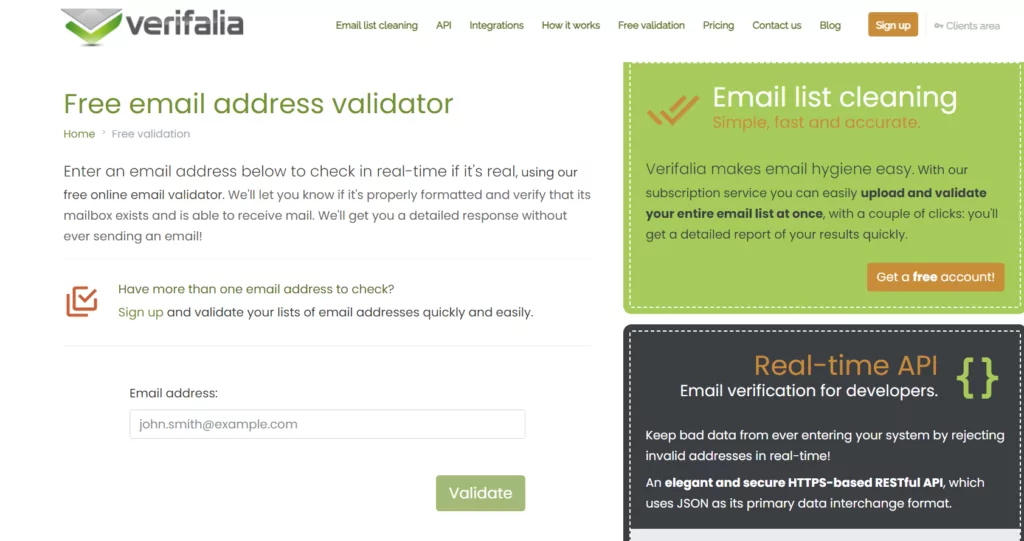
- Bulk email list cleaning
- Native integration with Zapier
- Pay-as-you-go
If you’re looking for email verification at multiple touchpoints, Verifalia is a great option.
Things it Does Well
- Email Verification API. Verifalia Email Verification API provides real-time single email verification and batch verification. The API seamlessly integrates into apps, web forms, CRM systems, email marketing platforms, and POS terminals to prevent invalid emails at sign-up and protect against fake sign-ups and spam attacks including disposable email detection. It also offers batch verification by uploading email lists, eliminating problematic data, and ensuring data freshness. The API is secure, using HTTPS and JSON, and can be easily integrated into applications with free and open-source SDKs.
- Integrations. Verifalia supports thousands of integrations with marketing automation tools, CRMs, Databases, and cloud services. Recently, Verifalia became officially integrated with Zapier so it can be leveraged across multiple processes and automation.
Best suited for
Enterprises that need to use integration to validate emails across multiple sources
Top use case
Bulk email list cleaning. Verifalia’s flexible and powerful API makes it a great email verification tool. You can also leverage their upload tool to upload your own list, download the results, and export.
Limitations
Beyond validation and verification, Verifalia doesn’t include any email marketing capabilities. However, Its rich integration features make up for it.
Pricing
Verifalia also offers a pay-as-you-use credit system. With pricing ranging from $7.90 for 1,000 credits, all the way up to $4,890 for 10,000,000 credits.
5. ZeroBounce
![ZeroBounce Best Email Verification Services. Cloud-based email verification]](https://www.devgold.com/wp-content/webp-express/webp-images/uploads/2023/06/Zerobounce-image-1024x538.png.webp)
- Powerful email finder
- Blacklist monitoring
- In-Depth email scoring
ZeroBounce is a leader in the email verification space for a reason. Not only is ZeroBounce a reliable provider of email verification and email validation tools, but its email finding and blacklist monitoring tools also put it in a class of its own.
Things it Does Well
- Email Finder. ZeroBounce has a great email finder tool that lets you search for prospect emails by providing a name and a domain. You can search for a single email, or upload a CSV to receive a bulk list of identified and verified emails. Beyond finding the email, ZeroBounce will check for role-based emails and perform other domain-level checks.
- Email testing tools help determine how well your email will perform across different mailbox providers. You can choose from over twenty of the most commonly used email providers and send your campaign to those addresses. Then, it lets you view and compare results across different providers.
- Blacklist checker. ZeroBounce will monitor your domain and notify you if you’ve been found on a blacklist. ZeroBounce can monitor three types of addresses: a standard domain (example.com), an IPv4 address (255.255.255.255), and an IPv6 address (2001:db8::8a2e:370:7334)
Best suited for
Enterprises that need to scale their email verification efforts can use hands-on coaching.
Top use case
Monitoring sender reputation and managing large-scale email lists.
Limitations
One criticism commonly associated with ZeroBounce is it is pricier than some competitors.
Pricing
Choose from pay-as-you-go or monthly pricing options. For pay-as-you-go, you can purchase a bucket of ‘credits’. You can refill credits every month for a discounted price.
ZeroBounce also offers monthly pre-built plans.
- Free Plan. Used for tester purposes.
- Starter @ $39/mo. Includes 1,000 monthly queries, 50 mail server tests, and inbox tests as well as 10 blacklist monitors.
- Team @ $99/mo. Includes 10,000 queries, 100 mail server tests, and inbox tests as well as 20 blacklist monitors.
- Pro @ $249/mo. Includes 25,000 queries, 500 email server tests, and inbox tests as well as 50 blacklist monitors.
- Enterprise @ $999/mo. Includes 200,000 queries, unlimited email server tests, and inbox tests as well as unlimited blacklist monitoring.
6. AbstractAPI
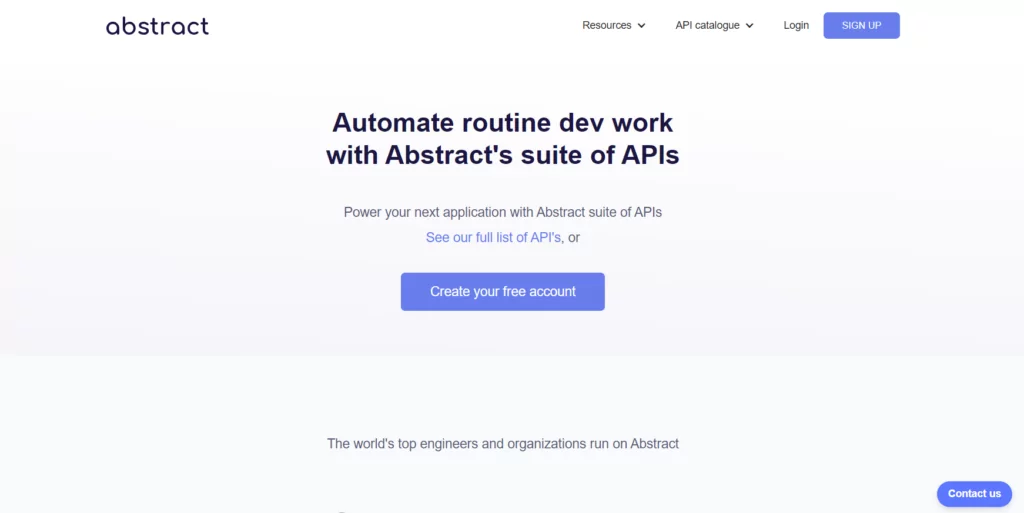
Abstract API is known for offering flexible APIs for multiple business cases, including email validation, email verification, and email enrichment APIs. Abstract has great documentation, making it easy to get started, even if you’re not as familiar with APIs.
Things It Does Well
- Clear documentation makes it easy to understand Abstract’s email APIs. You can get your free email verification API key and start making calls instantly.
- Multiple validation APIs. It doesn’t stop at email. Abstract solved hundreds of business use cases, especially when it comes to verifying and validating customer data. The Company Enrichment API is a neat value-add that can enrich any domain or email with accurate company data, like headcount, location, and industry. They also offer IP geolocation and Phone Validation APIs.
- Secure. Abstract API uses bank-level security. All data that is sent to Abstract’s Email Validation API and processed there is secured via 256-bit SSL encryption (HTTPS).
Best suited for
Developers building custom applications that want to use a variety of APIs from one place.
Top use case
Custom app development and extending tools with validation and verification APIs.
Limitations
Abstract API does not have the front-end capabilities of other tools. There are no dashboards or widgets. It’s just API.
Pricing
Abstract API’s email verification starts at just $9 a month for 5,000 requests, making it one of the better values of this list.
- Starter – $9/mo for 5,000 requests per month.
- Standard -$49/mo for 50,000 requests per month.
- Business – $99/mo for 100,000 requests per month.
- Pro – $199/mo for 250,000 requests per month.
- Growth – $499/mo for 750,000 requests per month.
7. Hunter

Hunter is the go-to for customer prospecting. With Hunter, you can find, validate, verify, and capture leads from almost anywhere. Hunter uses a blend of proprietary tech and artificial intelligence to help you quickly and effectively source lead contact info.
Things It Does Well
- Email Address Discovery: Hunter excels in helping users find email addresses associated with a particular domain or person. Enter the domain name and you can obtain a list of publicly available email addresses linked to that domain. They also offer a Chrome extension that allows you to find emails while browsing a prospect’s website.
- Bulk Email Verification: With Hunter, you can verify thousands of emails at once. Hunter’s verification is thorough and pulls from a database of over 70 million domains.
- Integration and API: Hunter.io offers a range of integrations and an API that enables incorporation into existing workflows or applications. It integrates with popular tools like Google Sheets, Salesforce, and Zapier, allowing users to extract and manage email addresses effortlessly.
Best suited for
Sales teams can use Hunter to find relevant contact information for potential leads for targeted outreach. Hunter streamlines the process of building prospect lists and helps sales professionals identify decision-makers within an organization.
Top use case
Freelancers and individuals in the gig economy can use Hunter.io to find the email addresses of potential clients or employers.
Limitations
Since Hunter pulls from public information, it is only as valuable as the information it is able to pull. If a company has not listed any email addresses online, then Hunter won’t find it.
Pricing
Hunter offers a free version and three paid monthly plans.
- Free – 25 Searches and 50 Verifications a month
- Starter – $49/Mo 500 searches and 1,000 email verifications
- Growth – $149/Mo 5,000 searches a month and 10,000 email verifications
- Business – $499/Mo 50,000 searches a month and 100,000 email verifications
Conclusion
Choosing the best email verification service depends on your specific goals. If you’re looking to leverage verification for a custom application, you might want to choose a service that offers a flexible API. If you need user-friendly, then reports and dashboard capabilities might better serve you. We hope this guide has been helpful to you.
One thing is for certain, If you prospect, market, or send an email at all, you need to verify your email addresses regularly.
FAQs
How accurate are email validation services?
Mail validation services vary in their accuracy, and their effectiveness depends on several factors. Here are some key points to consider:
- Syntax Validation: Email validation services typically start by checking the syntax of an email address. They verify if the email address conforms to the standard email format (e.g., [email protected]). This step helps identify obvious errors like misspellings or missing components. Syntax validation is generally accurate and can catch the most glaring mistakes.
- Domain Verification: The next step in email validation is verifying the domain of the email address. This involves checking if the domain exists, has a valid MX (Mail Exchange) record, and is configured to receive emails. Domain verification is reliable and provides a good indication of the email address’s validity.
- Role Account Detection: Some email validation services can identify role-based email addresses like [email protected] or [email protected]. While this feature is helpful in filtering out generic email addresses, its accuracy may vary depending on the service’s database and update frequency.
- Disposable Email Address Detection: Certain email validation services can flag disposable email addresses (DEAs) that are often temporary and frequently used for spam or fraudulent activities. While DEA detection can be valuable in filtering out such addresses, the accuracy depends on the comprehensiveness and up-to-date nature of the service’s DEA database.
- Catch-All Email Detection: Catch-all email addresses are configured to accept all incoming emails, regardless of whether the recipient exists. Some email validation services attempt to detect catch-all domains, but their accuracy may vary. It is worth noting that not all catch-all addresses are invalid or inactive, as some domains intentionally use this configuration.
- Relevance to Sender’s Goals: The accuracy of email validation services can also depend on the user’s specific goals or requirements. For example, if the goal is to filter out all invalid email addresses, the service may be highly accurate. However, if the objective is to identify deliverable or engaged email addresses, the accuracy may vary as the service cannot guarantee recipient activity or engagement.
Are email verifiers safe?
Email verifiers can be safe to use, but it depends on the specific email verifier service or software you choose. Generally, email verifiers are tools that help you verify the validity and deliverability of email addresses in your contact list. They can be useful for identifying and removing invalid, fake, or risky email addresses.
- Make sure you’re choosing an email verifier from a reputable provider with a track record of trustworthiness and positive reviews. Look for well-established companies that prioritize data security and have transparent privacy policies.
- You should also make sure the email verifier you use has robust data security measures in place. It should protect your data and the email addresses you upload from unauthorized access, misuse, or data breaches. Review the provider’s privacy policy and terms of service to understand how they handle your data.
- Check that the email verifier complies with relevant data protection regulations, such as the General Data Protection Regulation (GDPR) if you are in the European Union. Compliance with these regulations ensures that your data is handled responsibly and legally.
It’s worth noting that some email verifiers send test emails to verify deliverability. There is a slight risk of triggering spam filters or causing potential inconvenience to recipients. However, reputable verifiers take measures to minimize these risks and ensure that the verification process is respectful and compliant with email-sending best practices.
How often should I verify my email list?
The frequency of email verification depends on various factors, including the size and activity of your email list, how frequently you collect new email addresses, and the nature of your business. It is generally recommended to verify your email list periodically, especially before important email campaigns, to maintain list hygiene and ensure optimal deliverability.
What are the disadvantages of email verification?
While email verification services offer numerous advantages, there are also a few potential disadvantages to consider:
- False Positives: Email verification services may sometimes flag valid email addresses as invalid or risky. This can occur if the verification algorithms or databases are not up to date or if the email address has recently been registered or changed.
- Incomplete Verification: Despite the efforts of verification services, it’s important to recognize that no verification process is foolproof. Some email verifiers may not be able to accurately determine the deliverability of certain addresses due to various factors such as temporary email issues, strict server configurations, or other technical limitations.
- Cost: Depending on the service and the volume of email addresses you need to verify, the cost of using email verification services can add up, especially for large databases or frequent verifications.
- Privacy and Data Security: When using an email verification process, you need to share your email list or database with the service provider. Choose a reputable provider that has strong data security measures, transparent privacy policies, and compliant data handling practices.
- Technical Dependencies: The accuracy and reliability of email verification services depend on the quality of their algorithms, databases, and infrastructure. If the service you choose experiences technical issues or downtime, it may affect your ability to verify email addresses.

Grant is a Solution Architect and SaaS product reviewer. His work concentrates solely on SaaS and technology, collaborating with clients in DevOps, Testing, Endpoint management, and cloud hosting.

